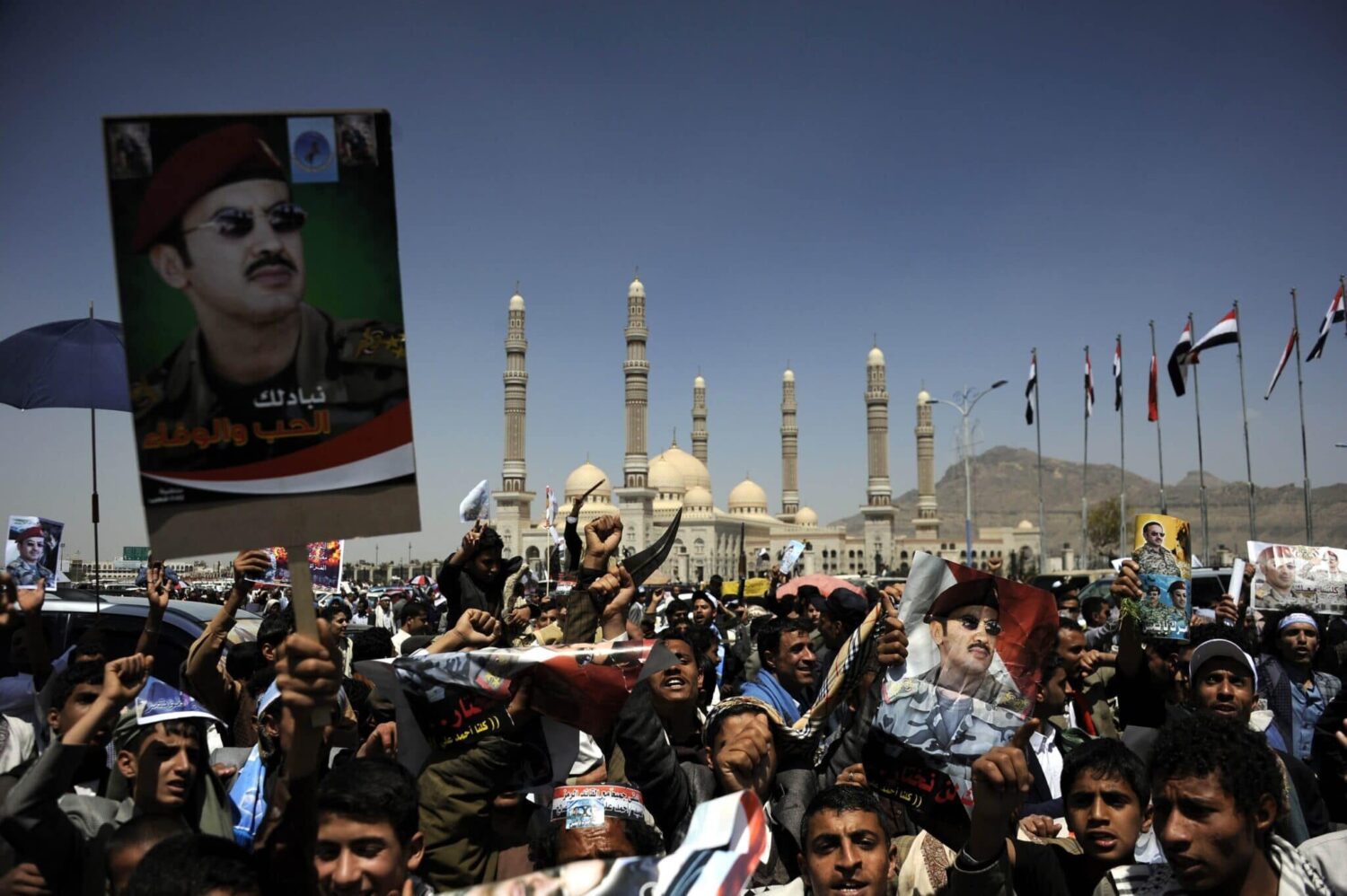
Most embassies in Yemen were closed in February 2015, and disputed president Abd Rabbuh Mansour Hadi left for Aden after he escaped—or was released?—by the Houthis from house arrest in Sanaʿa. The impoverished city in the south has become the makeshift home of a parallel government. Sanaʿa has been left to the Houthis and their government.
But not only to the Houthis. Pictures of Ahmed Ali Saleh, son of the ousted president Ali Abdullah Saleh, are popping up everywhere. The message: only he can save the country from the indescribable mess it got itself into. And the message may hit home. To Houthi-haters, Saleh’s son may be the only alternative.
Saleh has always been accused of backing the Houthi takeover of Sanaʿa in September 2014, not out of love for the Houthis—he fought them fiercely, on and off, for six years—but as a strategy to return to power. It would mean clever scheming, but that would be no surprise from a man whose specialty was scheming for 33 years.
The idea: let the Houthis take over. They are militants, not politicians, and will be unable to govern the country. They have indeed said repeatedly that they are not after the power. Apart from that, there are many people, especially Sunnis, for whom the Zaydi (Shiite revivalist) Houthis are unacceptable as rulers. And that is where Saleh’s son comes in.
That would probably be the reason for great relief in Riyadh. Saudi Arabia and the other (Sunni-ruled) member states of the Gulf Cooperation Council (GCC) are watching Yemen nervously. They believe that the Houthis are supported by Iran and that the Houthi takeover means Iran is in Saudi Arabia’s backyard, a horrific scenario.
“If the UN does not intervene, we will,” was the GCC’s message in February 2015, “just as we did successfully in Bahrain,” a Kuwaiti columnist and constitutional lawyer wrote, referring to the military interference by the GCC during Bahrain’s Shiite uprising in 2011. “It is time to chop off the head of the cobra,” he added.
But Yemen is not Bahrain. The tiny island state is literally across the bridge from Saudi Arabia, and a group of peaceful protesters made an easy target. Not so the Houthis, who are heavily armed and call Yemen’s rough mountain terrain their home. GCC intervention will therefore probably be only verbal.
A Pawn in the Struggle for Power
To outsmart Iran, others are saying, it may actually be better to grant Yemen membership in the GCC. Talks about Yemen joining the GCC have been going on for a long time, but nothing has come of them. The rich GCC states do not want their poor neighbor to join, fearing that Yemenis will come by the millions in search of jobs.
Nevertheless, GCC membership in Yemen would anger Tehran. This would thus be the perfect time for the Yemeni government to push for GCC membership. The problem is, which Yemeni government? After he fled Sanaʿa, Hadi declared that he was still president, saying his forced resignation was illegitimate. Both the West and the GCC seem to support his claim.
Meanwhile, Iran (which has always denied involvement in the Houthi coup) and the Houthis are cementing their relationship. On 1 March 2015, the first Iranian flight landed in Sanaʿa. Saba, Yemen’s official news agency, now controlled by the Houthis, said that 14 flights a week would operate between Sanaʿa and Tehran.
It is not only flights that are beginning to reach Yemen; Iran also recently pledged a year of free oil for Yemen. “You can’t buy Yemenis, but you can hire us for the day,” wrote the well-known blogger and businessman Haykal Bafana. He added, “But I find it hard to demonize Iran. Iranians don’t kill Yemeni civilians with drones or deport hundreds of thousands of poor workers,” referring, respectively, to the United States and Saudi Arabia.
It shows that Saudi Arabia and its GCC partners will have to try to win back the hearts and minds of the Yemeni people. Disputed President Hadi will not be able to do that, as he has lost credibility with most Yemenis, and the Saudis realize that. Ahmed Ali Saleh may, in fact, be a better option, as the Saudis (and the West) also know. The problem: how can they possibly back the son of a president who resigned in 2011 under their pressure?
The only way out may be to push for elections, which must then be won by Ahmed Ali Saleh. That can be done. Saleh is said to have amassed up to $60 billion, according to a UN agency. Even if that amount is exaggerated, he should have enough to buy the necessary support. And if not, he need only call Riyadh. This scenario is oddly similar to the situation in Yemen before 2011, and it may very well be that this is just where Yemen is headed now.
Or not—it is impossible to predict Yemen’s future, but it is safe to say that the country will not see better days soon. The country is a mess, not only because of its internal struggles but also because it is a pawn in the struggle for power in the Gulf between Saudi Arabia and Iran.
The GCC is now planning talks among the protagonists in Yemen’s crisis, but they may fail before they start. President Hadi realizes that the Houthis will not come to Aden and suggested Riyadh as the venue for the talks, where, in fact, the Houthis are on the list of terrorist organizations. The Houthis refused and insist on Sanaʿa. So does Saleh’s party. If the agreement on a venue is such a thorny issue, it is difficult to see harmony on more significant matters.


